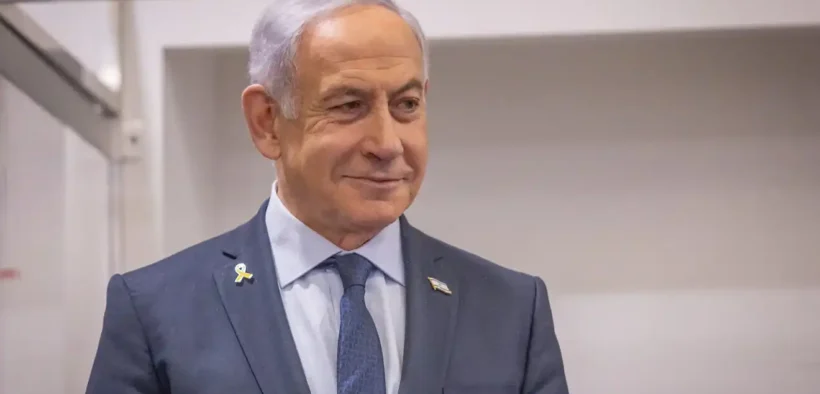Netanyahu Escalates Strikes on Iran as Global Tensions Boil Over
Share

Benjamin Netanyahu is no stranger to confrontation. But even by his own standards, Israel’s recent military escalation against Iran marks a stunning, high-risk shift in regional dynamics, and potentially, the global order.
Over the past week, Israel, under Netanyahu’s direct command, has launched a string of devastating airstrikes on Iranian military and nuclear installations. Among the targets were radar systems, weapons stockpiles, and sensitive infrastructure near Iran’s nuclear research facilities.
These strikes have drawn global attention not only for their scale, but for their timing, coordination, and chilling implications.
“This is just the beginning,” Netanyahu declared in a press conference in Jerusalem. “Iran will not get a nuclear weapon—not on my watch.”
Targeting Tehran’s Nerve Center
One of the most symbolic and controversial strikes came when Israel bombed the headquarters of Iran’s state broadcaster IRIB during a live news broadcast. Footage showed anchor Sahar Emami fleeing the studio mid-sentence as dust and debris filled the air.
The Israeli Defense Minister, Israel Katz, later called IRIB “a pillar of Iranian incitement and regime propaganda.”
But Netanyahu has gone even further.
In a primetime U.S. interview with ABC News, the Israeli Prime Minister refused to rule out targeting Iran’s Supreme Leader, Ayatollah Ali Khamenei. “Would it end the conflict? Yes,” he said flatly. He went on to describe Iran’s nuclear scientists as the modern-day equivalent of Hitler’s engineers, arguing that “removing them would save millions.”
It’s the kind of statement that sends shockwaves through diplomatic circles and signals just how much Netanyahu is willing to gamble.
On the ground, the cost has been staggering. Iran’s missile retaliation campaign has pounded Israeli towns and cities. At least 14 civilians have been killed in Tel Aviv, Haifa, and Beersheba.
Over 200 have been injured. Meanwhile, Israeli strikes have reportedly killed more than 220 people in Iran, including military personnel and civilians caught in the crossfire.
Despite the growing toll, Netanyahu’s approval ratings at home have soared—at least temporarily. Even longtime political adversaries such as Yair Lapid have backed the military offensive, calling it “a necessary stand against a genocidal regime.”
This moment of national unity is rare. But whether it lasts remains to be seen.
What the U.S. Knew and Didn’t Approve
Behind the scenes, Netanyahu’s ambitions may have ruffled feathers even among close allies. According to CBS News, former U.S. President Donald Trump reportedly rejected a Mossad proposal to assassinate Khamenei during his term, fearing it would ignite a regional war.
Current U.S. officials have yet to comment directly on Netanyahu’s comments, but actions speak louder than words. The Pentagon has ordered the evacuation of American military families from bases across the Middle East, an unusual step that underscores how serious Washington considers the threat of escalation.
Analysts say the U.S. is now walking a tightrope: publicly backing Israel’s right to defend itself, while privately urging restraint.
A Wider War? Or a Regime Shift?
There’s a deeper question simmering beneath the surface: Is Netanyahu aiming simply to dismantle Iran’s nuclear infrastructure—or to collapse the Islamic Republic entirely?
In recent days, the Israeli Prime Minister has hinted that regime change in Tehran “could be a natural outcome” of sustained pressure. He argues that the current Iranian leadership poses a danger not just to Israel, but to regional stability and global security.
Yet critics argue that such ambitions are naïve—or worse, reckless. “If you remove Khamenei without a plan for what comes next, you create a power vacuum,” says Dr. Lara Menendez, a foreign policy expert at the Council on Foreign Relations. “That’s how you get failed states—and the rise of extremists.”
The Global Ripple Effects
The fallout has already begun.
- Oil prices spiked to $122 per barrel—the highest since 2022—causing panic in global markets.
- Airlines have suspended flights across the Gulf region, and international freight companies are rerouting shipments to avoid the Red Sea and Persian Gulf.
- Diplomatic tensions are flaring from Brussels to Beijing. Russia and China have condemned Israel’s strikes, while EU leaders remain divided on whether to intervene diplomatically.
For Netanyahu, this moment may define his legacy. After years of political turmoil, criminal charges, and domestic protests, he now finds himself at the helm of a war that could reshape the Middle East.
To his critics, he is a war hawk playing with fire. To his supporters, he’s the last man standing between Israel and annihilation.






















